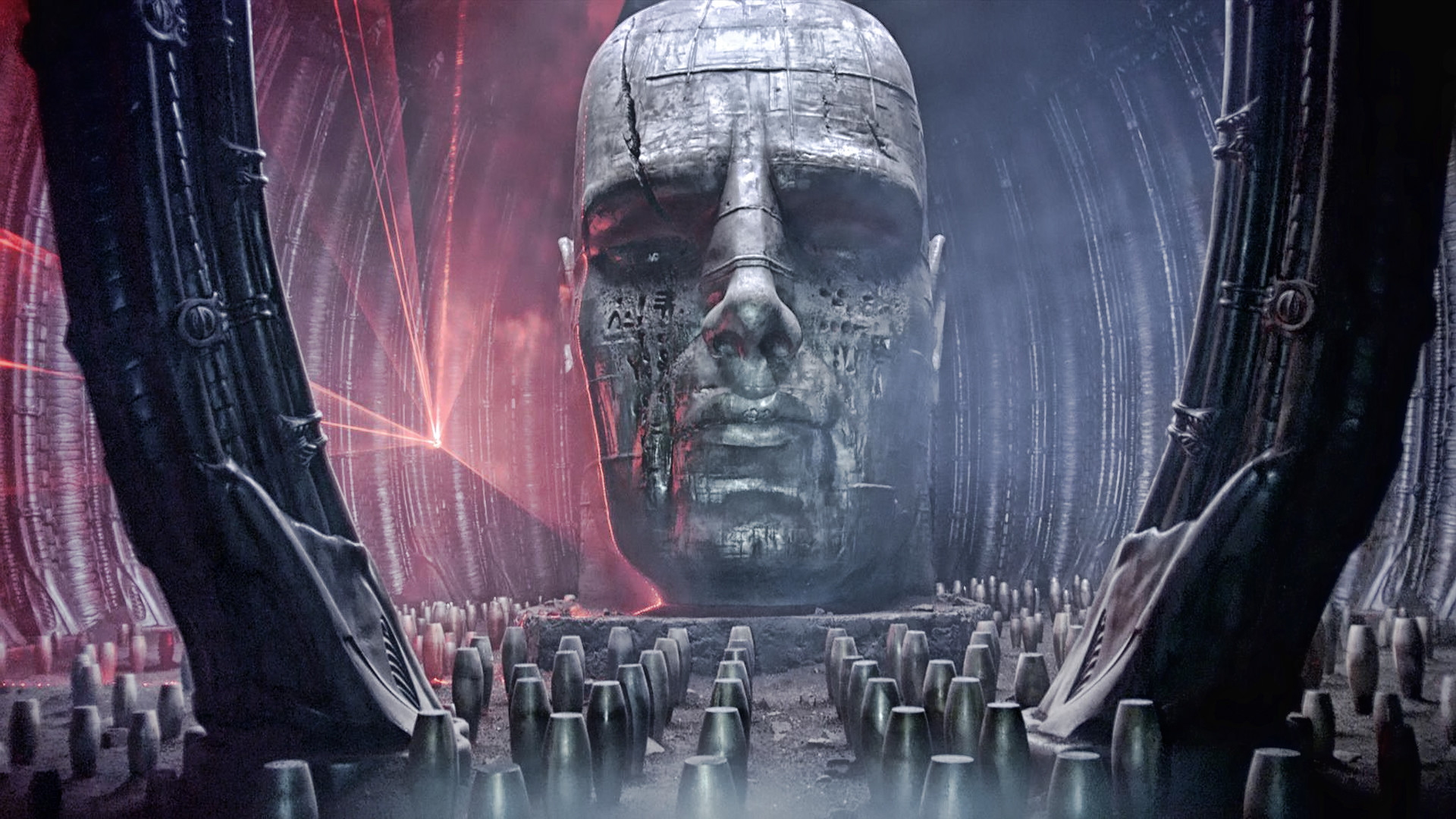There are only two things in the world, determinism and freedom, and only freedom is real. Of the two of these things however, determinism is the only one we know or care about!
Determinism is the only thing we know – generally speaking – but we don’t know it for what it is. If we knew it for what it is we would also realise that it isn’t real, but we don’t see deeply enough into things to realise that. We actually think that determinism is freedom, and so we never miss the real thing. How could we mistake determinism for freedom? This seems like a very big mistake – it’s like mistaking ice for fire, or mistaking darkness for light! It scarcely seems possible that such a big mistake could be made!
The reason we are able to make this mistake is simple – we are able to make it as easily as we do because of the basis that we have assumed. Our basis is that of ‘positive being’, which is to say defined or definite existence. Because we have assumed a positive (or definite) basis we are unable to see anything for what it is. Our assumptions are skewed and so therefore is everything that we see.
With the defined identity as a basis therefore, there can never be any freedom. They can never be any freedom for the defined identity because to be defined is to be unfree. How could we be defined free and defined at the same time? If I’m defined then I can only be was I am defined as being at and this is not freedom! ‘Had I been free I could have chosen to be not me‘, as Robert Wyatt says in his song Last Will And Testament.
The defined identity nevertheless experiences itself as having either freedom or the possibility of freedom. The problem with this is that its understanding of ‘what freedom is’ is an inversion of the actual reality. The ‘positive self’ or ‘defined identity’ sees freedom upside down, in other words.
For the positive self freedom means one thing and one thing only – it means the possibility of realising its wishes, or to put this another way, it means the freedom to be able to project its own way of seeing things on the world in a completely unimpeded way. The positive self sees freedom in its own terms, therefore and we can hardly blame it for that! But what is freedom when seen in terms of the deterministic or unfree viewpoint?
Our ‘positive basis’ is our only possible way of seeing things. We just don’t have any other way available to us and the only way that freedom can be understood therefore is from this standpoint. From this standpoint what freedom means is – as we have said – that there isn’t anything to obstruct our purposeful activities. There are no obstacles to us obtaining what we want, in other words. We are given an understanding of what is right or true or proper by our assumed basis and so freedom can only mean that what is right or true or proper can be facilitated to happen, can be facilitated to be the case. I am ‘free’ to obtain my goals, in other words. I’m not on the other hand able to question whether my goals are worth obtaining and that is where the inversion of freedom comes in.
Conditioned freedom means therefore that I am free to exercise my will (such as it is informed by my assumed basis) without anything getting on my way. While it sounds (on a superficial level at lease) that freedom is ‘what is empowering for me’, what is happening when I enact my ‘will’ is that I’m enacting the will that my deterministic basis is providing me with, and so it is the assumed basis that is being ‘empowered’ here, not me! If I was what I take myself to be then I would be being empowered but I am not what I take myself to be and so it is the deterministic illusion that is being empowered.
This is a very important point to understand because it makes crystal clear exactly what ‘freedom’ means to us when we are operating on the basis of the thinking mind – freedom means that our underlying assumptions (all the stuff that we have taken for granted) gets to be transposed onto reality without any hitches. Our assumptions get to be ‘proved true’, in other words (although there is no way that this is ever going to be acknowledged).
This really is the most fantastical misrepresentation of ‘freedom’ – the Principle of Freedom has been so twisted that it has come to mean ‘the freedom not to be free’ and none of us have noticed this inversion happening. The freedom to prove to myself that my assumptions about reality are in fact totally true (and therefore never need to be questioned) is not any sort of freedom at all – what we’re looking at here is the ‘freedom to avoid reality’ (or ‘the freedom to believe in my own illusions) and this type of supposed ‘freedom’ will very effectively prevent me ever being free.
Reality actually is freedom, so if I am empowered to avoid reality (which will never under any circumstances accord with my lazy assumptions) then I am being empowered to avoid freedom, which is a strange sort of empowerment! This is exactly the type of empowerment that is being offered to us by the deterministic modality – the freedom to be unfree without knowing it.
If we actually pushed this type is freedom far enough we would eventually discover for ourselves that what we are aiming at so determinedly for isn’t freedom at all but something quite different. This is inherent in the idea of the Paradox of Control‘ – i.e. when we finally get what we’ve been trying so hard to get we discover that it was not what we wanted after all. The whole endeavour, the whole exercise, was totally misdirected in other words. Our apparently ‘self-benefiting’ activity was working against ourselves the whole time.
We rarely if ever to see this of course but we could if we took the time to do so. In a strictly practical way our goals are (or can be) useful but – as we have implied – there is a hidden agenda to us being interested in attaining goals all the time and that has to do with proving that our basic assumptions about the world are correct. Control is how we get (or try to get) reality to conform to our ideas about it, in other words; if I can successfully realise my goals then this implies (without ever directly stating it) that my ‘angle’ must be the right one. But if we were to succeed in this endeavour we would be shooting ourselves in the foot – we would have gotten ridden of reality completely in this case (since there is no ‘correct angle to take on reality’) and so where would this leave us?
The freedom to ‘do what we want’ (or ‘exercise our will in an unimpeded way’) isn’t as wonderful a thing as it might on the face of sound because what we are actually trying to do here (if only we could have the insight to see it) is to project our ideas of the world onto the world in such a way that nothing else remains. We’re trying to ‘murder’ reality in other words; we’re trying to commit ‘the perfect crime’, as Baudrillard says. This – as far as we’re concerned – represents the highest possible expression of freedom to us! It’s the ultimate thing to aim at therefore. It’s the Ultimate Jackpot.
But what exactly is this jackpot’? What does it come down to? What prize do we win when we have ‘successfully murdered reality, when we have ‘successfully carried out the perfect crime’? When we succeed at getting what we want to happen to happen (so that the ‘error’ equals zero, so that Actual exactly equals Expected) then we have attain the station of Perfect Redundancy. That is the exalted state that we can now rejoice in. ‘Perfect redundancy’ means that there is a hollow illusion of something being there when actually there isn’t anything there. ‘Reality’ is when there is a maximal mismatch between E and A (what we expect and what we get); when there is a match between the two then this is bad news because that means that what we have actually attained is not reality but a Null State of being. We have attained ‘the Nullity’.
The Nullity is no jackpot – on the contrary, it’s the ultimate hollow prize. It’s the appearance of something great that gives way to that very strange situation where we appear superficially to have a real or authentic existence when actually we don’t. What we have attained is unreality, but more than this, what we have attained is a type of unreality that we can never recognize for what it is and for this reason we end up accepting ‘second best’ as the genuine article. We end up accepting the ersatz commodity the real thing; we end up with Hyperreality, in other words. We will eventually discover that we have been short-changed (since all illusions wear thin in the end) but only very, very slowly…
As time goes on we will grow to notice the illusion wearing thin. It’s already thin but it will gradually get thinner and we will start to notice that life is somehow ‘falling short’; we will start to notice that life is losing its flavour and that our enjoyments are getting dulled. More than this, we are likely to notice that life is taking upon a negative flavour that we don’t at all – the Nullity is not ‘the bringer of joy’, after all! The Nullity is not renowned for its happiness-producing qualities. Through controlling we unfailingly create the Nullity and this is not a ‘good thing’. What we are doing is not healthy, what we doing is not wholesome – what we’re actually doing is assiduously and meticulously building the world of pain and suffering for ourselves, under the erroneous impression that we are doing something good or doing something useful!
We have created a world in which everything we do comes down to ‘trying to get blood out of a stone’, or ‘trying to pick lovely ripe figs from thistles’. The currency were trading in therefore is ‘false hope’ therefore – all hope in the Null World is false hope! In the Null World we are compelled to ‘go through the motions’ as if driven by a tightly coiled steel spring. As Robert Wyatt says,
Sheer momentum makes us act this way or that way
We just invent or just assume a motivation
We are driven to mechanically hope just as we are driven to mechanically despair and none of this means anything. How can anything that we don’t do freely ‘mean’ anything, after all? The only real act is that act which is done freely done but nothing is ‘freely done’ in the deterministic world, obviously. By definition nothing is freely done in the deterministic realm! But if all our so-called ‘meaning’ is deterministically determined by the tightly-coiled steel spring that drives our mechanism, where does this leave us when the spring eventually unwinds?
Image: wallpaperup.com






